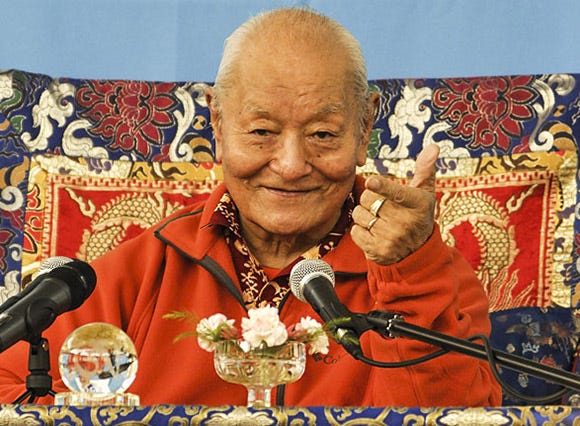Thought
“A practice that helps coordinate body, energy, and mind while making us more balanced and free from tension is immensely important. When we have a more relaxed mind, it is possible to have a better, more harmonious, and healthy life.”
—Chögyal Namkhai Norbu

Application
We begin life with an inhale, and end with an exhale.
Life is breath.
This morning, we’re going to continue in our study of the “non-doing,” looking at the wisdom which surrounds the automatic activities we usually take for granted. In many ways, we’ll see repeated this week that awareness provides access to deep reservoirs of wisdom waiting latently within us to discover.
Yesterday we considered the intelligence of sleep, and today we’ll note the healing energy of breath. We’ll approach this topic through Yantra Yoga, which is a school of philosophy, spirituality, and practice originating in Tibetan Buddhism. (And we’ll get a little more into that in the backstory below.)
Yantra Yoga can best be understood by comparing it first to its counterparts Asana or Hatha Yoga. These forms of Yogic practice are what most folks in western countries have been first introduced to as yoga—static poses that aid in the health and longevity of our body and mind.
Yantra Yoga on the other hand is not static, and seeks to “coordinate and harmonize one’s personal energy so that the mind can relax and find its authentic balance.”
At the core of Yantra Yoga is seven phases movements which are connected to seven phases of breathing. This breathing is meant to bring specific elements of healing, awareness, and overall harmony into our lives. It is based on an ancient text called the Nyida Khajor which roughly translates to the “Union of the Sun and the Moon.”
The entirety of Yantra is about finding the harmony that exists between the tensions and opposites of our lives.
If we think about what stress is from an engineering or mechanical perspective, it’s the effect of pressure exerted on opposite poles of an object (say a beam) forcing it to be in two places at once (i.e. north and south).
That stress eventually leads to a weakening if not fracturing of the object. In many ways, our mental health will feel a similar strain when we want or feel the need to be in multiple phases, places, or follow certain desires at the same time.
Yantra addresses this core neurosis of the modern world, bringing deep harmony and healing through the most basic of human functions—breathing. Breath brings harmony.
Our breath is always there. It resides underneath every moment of the day, every word we speak, and every minute we sleep. We can only last a few minutes at most without it. Breath is life, and life is breath.
And breathing has a deep connection to the state of our nervous system, which in turn determines the mental state we keep—that of fight or flight, or that of rest and calm. In the former, we amplify our stress seeking to resolve conflicts erratically, the latter we can observe and make choices patiently and rationally without furthering our internal stress.
Breathing and our stress state is directly related, and it is a two way street. The state of our nervous system effects our breathing, and our breathing effects our nervous system. Multiple scientific studies have correlated the state of your breath—fast and inconsistent versus controlled and deep—with a resulting change in our nervous system.
Specifically, controlled, slow breathing activates our parasympathetic nervous system (which brings states of calm and rest) as well as healing by delivering increased oxygen to our bloodstream encouraging enriched and increased blood flow.
So we conclude with the reality that breath is your life, that breath determines your internal state, and breath effects your overall health and well-being in the most fundamental ways.
One day we each will exhale for one last time and no longer have breath or life. So today, how can we cultivate, respect, and honor that most scared of functions which supports and underlines all that we do as humans?
Backstory
Yantra Yoga has largely been a practice which was kept secret, primarily taught through exclusive oral tradition passed down to a specific line of masters which kept the art alive and protected.
It belongs to a school of Yoga known as Dzogchen which is considered a path to enlightenment that is fast, deep, and powerful and also available to all who wish to pursue it.
It’s accessibility coupled with its strength, made it ideal for reaching a wider audience in a post-industrial society.
In the 70’s, a keeper of this tradition, Chögyal Namkhai Norbu, decided to share the secrets of Yantra with the world. He was invited to Italy by a professor in Rome which launched the movement with a receptive audience outside of Tibet.
He founded multiple Dzogchen schools all over the world and continued to share Yantra Yoga even online over webinars and video conferences.
Dzogchen seeks to bring harmony in one’s life, to bring awareness to one’s essential existence, and provide access to the deepest sources of knowledge we each have within ourselves.
You can read the distilled wisdom of Chögyal Namkhai Norbu in his book YANTRA YOGA: The Tibetan Yoga of Movement as well as visit their main site to find a school near you or absorb hundreds of hours of online content.
There is also a great book written by an American, Allison Choying Zangmo, who spent years studying the practice in Tibet called The Tibetan Yoga of Breath.
In all of these resources you can learn more about the 7 movements and breaths, the deeper history and practice of Yantra, and how to cultivate breath, awareness, and wisdom in your own life.
Just like sleep, breath is intelligent and is waiting to show us the deepest and wisest parts of our being. We just have to slow down long enough to listen.
Friends, I hope you enjoyed this installment of the philosophy of non-doing. I’m excited to continue to this conversation tomorrow and I really want to hear from you!
Please leave a comment below, and share with your friends that would find this interesting!
-Matt
References:
http://www.yantrayoga.net/about
https://dzogchen.net/dzogchen/
https://www.scientificamerican.com/article/proper-breathing-brings-better-health/














Philosophy of Breath